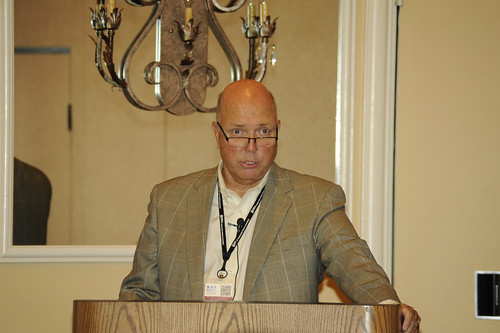
There’s an old Chinese proverb:
If you want one year of prosperity, plant corn.
If you want ten yers of prosperity, plant trees.
If you want 100 years of prosperity, educate people.
This proverb illustrates Mosaic’s approach to dealing with the hostile public environment that surrounds the issue phosphate mining. To prosper, Mosaic needs to continue mining in a positive atmosphere with public approval.
Some background:
Phosopate is a vital natural resource found more in Florida than other states. Phosphate rock is processed in Florida and shipped around the world. Phosphate mining goes back to the 1800s and is one of the oldest industries in the state. Mosaic fertilizer is used by farmers to grow crops, and is an integral part of the food chain.
About 10 years ago, communities in Polk and Hillsboro counties began to run out of phosphate reserves. At that time, Mosaic needed to begin mining elsewhere along the west coast, which means approval of permits and getting approval from citizens and local governments. Because of the controversial nature of phosphate mining, negative headlines quickly began to appear in the papers, and phosphate mining became a hot political topic on Florida’s central west coast.
To gauge public opinion, Mosaic surveyed the public in their target communities.
Results:
- Public didn’t understand the advances in the phosphate industry
- Public didn’t understand the value of phosphate mining
- Public feared that the industry would roll over the environment as in the past before regulation
- Public believed that economic tradeoffs in other counties wouldn’t benefit them.
- Didn’t know Mosaic (which was positive)
From the survey results, Mosaic crafted a long-term plan…
PHASE ONE: SHORT TERM
If you want one year of prosperity, plant corn
- Launched a generic campaign about the phosphate mining industry as a whole… not about Mosaic as a corporate brand.
- This industry image campaign was funded entirely by Mosaic.
- Mosaic chose to advertise specifically because the earned media they were receiving was primarily negative.
Key messages of the “Florida Phosphate” campaign– Florida Phosphate: So America Grows”
- Florida Phosphate cares are about environment
- Phosphate is important to the local economy
- America’s farmers rely on Florida, not foreign sources, for fertilizer
- Phosphate is a good corporate citizen.
Television ads focused on Simple messages, humanizing the industry, and showing good environmental stewardships. Videos featured Florida farmers, multi-generation Florida residents, and Mosaic employees. (check http://mosaicfla.com/news.asp?page=video for some of these videos)
Television was followed with direct mail.
Finally, this stage was accompanied by a website which responded to key issues and misconceptions http://www.floridaphosphate.com/
PHASE TWO: TWO YEARS LATER
If you want 10 years of prosperity, plant trees
At this point, Mosaic updated the campaign with the intent of to deepen their roots with people. At this point, they chose to introduce the Mosaic brand and branding it as a company.
As a new brand… job one was communicating the link to the food we eat
Television ads focused on Mosaic as an environmental steward and an innovator on the cutting edge of energy efficiency.
TV also focused on expressing the corporate values and Mosaic’s corporate citizenship.
Print ads, focusing on the same concepts, also went into rotation.
Mosaic’s latest campaign: “I am Mosaic”
Television ads showing the economic impact of Mosaic, and show the number of people who are employed by Mosaic, as well as those who are economically dependent on Mosaic. Also focuses on employees and jobs within the company, as well as Mosaic’s environmental stewardship.
Print ads also in rotation focusing on positive environmental stewardship
Outdoor billboards are also included regionally in areas that were part of Mosaic’s environmental footprint.
The strategy also includes online banners on websites of newspapers that cover Mosaic and phosphate issues. That way, even if there’s a negative story about phosphate, there’s still a positive message about Mosaic, too. The banners link to http://mosaicfla.com, which is a website focused on the campaign message.
Finally, direct mail is about to drop.
All of the print media uses consistent recognizable graphics.
The “planting trees” part of the campaign also utilizes targeted positioning ads. These ads are print-only.
Some concepts:
- Managing our water for generations to come
- We know the value of water and work to preserve it
- Creating smiles across Hardee county
- We support our communities and want them to thrive (incudes a tie-in to United Way)
- We donate food… (shows support of Feeding America)
- Life after reclamation in DeSoto county.
PHASE TWO: LEGACY PROJECTS
If you want 100 years of prosperity, educate people
Up until this point, this was mostly advertising and campaign work. These legacy projects go beyond advertising and PR, and focus more on education… and making sure that Mosaic doesn’t just “Talk the Talk” but also “Walks the Walk.”
Because Mosaic owns enough land to make a difference, this stage includes the building of education centers, wetland habitats, and nature trails.
- Example: Mosaic coastal education center, an outdoor classroom operated in partnership with Hillsboro School district.
- Bringing 4th graders in for hands-on environmental education, prepares them for science FCATs.
- Has won local, state, and national awards
- Mosaic also partners with agencies such as the Audubon Society and Ducks Unlimited.
- “Streamsong” resort is their next, biggest Legacy project.
- “Streamsong” is a luxury resort that is being built on old phosphate mining land that Mosaic is reclaiming. There was once a mining town there, but it is long gone.
- Hundreds of jobs (including about 200 full-time jobs) will be created by resort.
- Mosaic hopes Streamsong will serve as a prototype for post-mining sustainability. It will show people how reclaimed land can be commercially developed in a environmentally-friendly manner, and also become a driving economic force.
- Streamsong’s golf courses have already been making news worldwide.
Through these initiatives, Mosaic shows they’re ready to walk the walk.
Q&A Session:
Q: What is Mosaic doing with the Tampa Bay Rays?
A: Mosaic has partnered with the Rays through “Home Runs for Food.” For every home run hit, Mosaic contributes $500 to Feeding America.
Q: Have you done any post-surveys since the initial survey?
A: Mosaic has done them every year. After learning that the phosphate industry hadn’t been telling its story well, now they’re moving the needle. After two years of the initial “Florida Phosphate” campaign, the numbers moved enough that they were comfortable with promoting the brand as opposed to just the industry.
Q: How has the campaign impacted local governments (county commissioners, etc)?
A: Before the campaign, even politicians who supported the phosphate industry steered clear of it. Now they’re more comfortable with talking about the issue. When applying for mining permits, Mosaic has seen a less litigious environment in several counties. They have also seen a difference in attitudes of commissioners—now phosphate mining isn’t necessarily viewed as a political risk any more.
Q: What kind of internal education did you pursue?
A: Mosaic produces an internal newsletter, and any time they launch a new ad, it’s sent to employees to view first. Mosaic conducted an employee poll, and asked what kind of communication their employees would prefer. The response was a request for more face-time with senior management, so now senior managers do Q-and-A sessions with employees.
Q: Have other industries approached them about the campaign?
A: No, but one of their competitors started a smaller program to piggy-back off of the “Florida Phosphate” buzz.
Q: Have you incorporated social media?
A: Slowly. They have twitter and facebook, but have typically made it more issue-specific rather than brand-oriented
Q: This campaign is very long-term… research started in 2005-6. Did leadership know the plan would take that long?
A: Was always presented as a multi-year plan. There has been some pressure to back off of the campaign because of cost. To steer clear of budget cuts, they try to show the cost of stopping the campaign. They take every opportunity to remind corporate management of its success.
Q: How do you work with people still stuck in the negative mindset towards phosphate?
A: Mosaic opens its doors to both enemies and friends, by doing tours of facilities and being open. They conduct about 200 tours a year.
Q: Have you had to deal with social media attacks, either on your site or on other sites?
A: Mosaic’s microsites use more one-way communication. While they have had to defend themselves at times, they use our microsites quite a bit to defend themselves by telling their stores.
